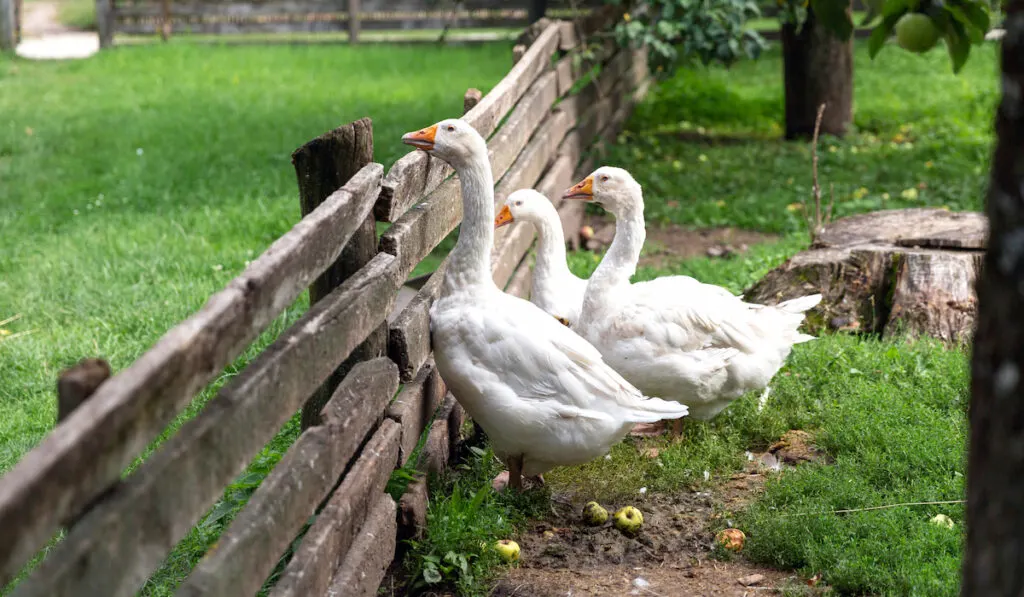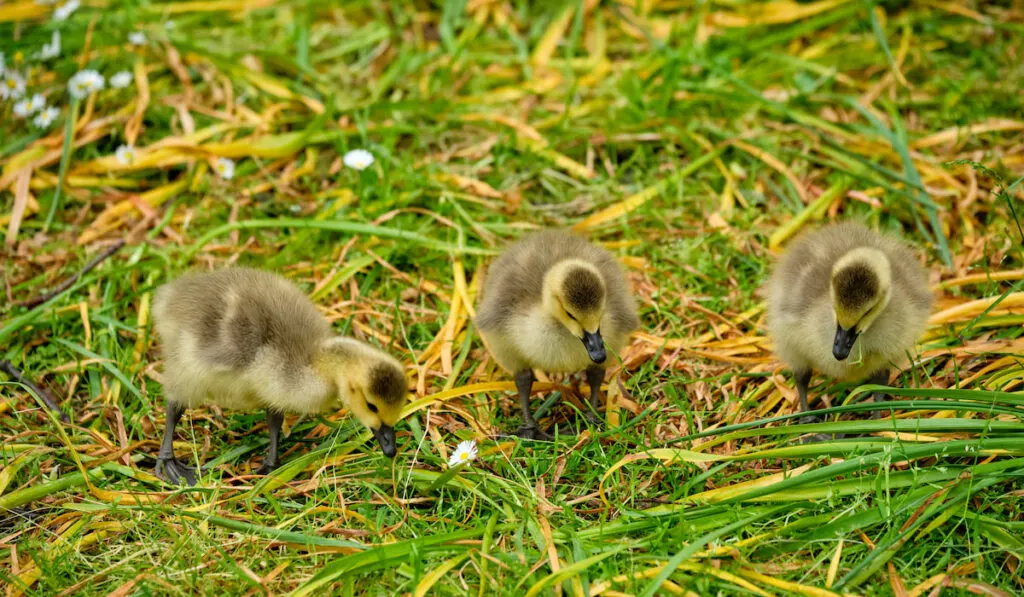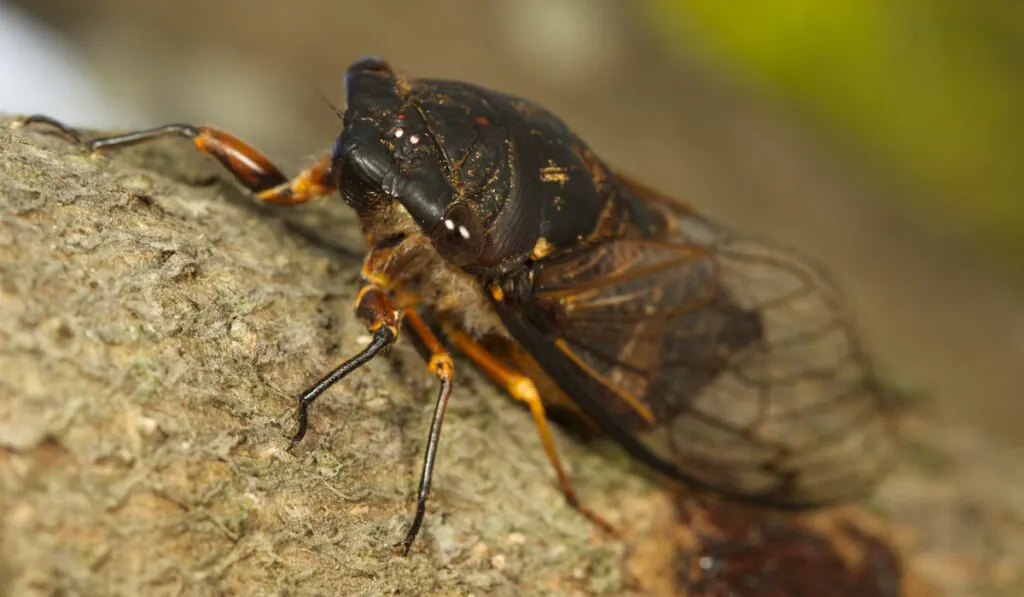Geese are lovable birds that a lot of fun to raise. Geese are easy to raise especially when they are free-range. Geese allowed to forage for their own food eat several types of food.
Now that cicadas are back, your geese will surely eat them. Geese can eat cicadas. It is not just safe for them, cicadas are also beneficial to them. Your geese will love the cicada season.

Table of Contents
Is Eating Cicadas Safe for Geese?
You do not have anything to fear about your geese eating cicadas. Cicadas do not carry any diseases and they do not bite or sting. This means that it is completely safe for geese to eat cicadas.
It doesn’t matter whether you are raising matured geese or young geese (goslings), you can allow your geese to eat cicadas.
Do Cicadas Have Enough Nutrients for Geese?
The table below shows the nutritional value of cicadas:
| Nutrient | Nutrient Composition Range (By Age) |
| Protein | 20-76% |
| Fat | 2-50% |
| Carbohydrate | 2-50% |
| Fiber | 30-45% |
(Source)
Now that you know the amount of some nutrients present in cicadas, check out the table below for the nutrient need of geese and compare both tables.
| Nutrient | 0-4 Weeks | 5-8 Weeks | Older than 8 weeks |
| Protein | 20% | 16% | 15% |
| Fiber | 5% | 5% | 5% |
| Energy | 2800 Kcal/kg | 2850 Kcal/kg | 2900 Kcal/kg |
| Fat | 3-5% | 5% | 5% |
(Source)
As you can see, cicadas have more than enough proteins, fat, fiber, etc. for geese. This means that your geese will not suffer from nutrient deficiency when they eat cicadas. It also means that your geese can at as many cicadas as possible because cicadas are extremely beneficial to geese.

What Else Do Geese Eat?
Here are other foods that you should provide for your geese:
1. Processed Feed
When you buy a geese mix or any processed feed made for geese and ducks, your geese will grow quickly because they have an abundance of every nutrient that they need.
Giving your geese the right mix ensures that they grow more quickly and healthier and that there’s always food available. A processed feed can be expensive (according to the protein content), so you can consider other options as well.
2. Seeds and Grains
When they forage for their own food, geese and other farm birds search for items such as seeds and grains. They can eat the seeds of some common plants and seeds. Examples of grains that your can feed your geese are barley, rye, sorghum, and millet.
Grains and seeds also make great treats for geese, so you can use them to train your geese. Another awesome reason you should feed your geese with grains is that grains can keep farm birds such as geese warm during the winter night because digestion of grains can generate heat.
3. Mealworms and other Insect Larvae
Mealworms are the larvae of the mealworm beetle. Mealworms and other insect larvae such as black soldier flies contain enough proteins for your geese and they make great treats.
If you like, you can even cultivate mealworms for geese by yourself.
4. Whatever They Can Find in Free-Range
To save cost, you can allow your geese to search for food in free-range. Some items that geese can eat in free-range are:
- Seeds
- Weeds
- Insects
- Spiders
- Earthworms
- Snails
- Nematodes
Geese can eat a lot of items during free-range, so you should allow them to go out and forage. It can save you a lot of money.
5. Fruits and Vegetables
Fruits and Vegetables will give sufficient minerals and vitamins to your geese. Geese need minerals and vitamins to grow healthy and strong. Examples of fruits that you can give to geese are:
- Apples
- Bananas
- Watermelons
- Kiwis
- Mangoes
Examples of vegetables that you can give to your geese are:
- Lettuce
- Cabbage
- Kale
- Carrots
- Broccoli
Do ensure to provide healthy fruits and vegetables to your geese and make sure that the fruits and vegetables are properly washed.
Healthy Treats for Geese
Some healthy treats that geese love are:
1. Cooked Beans
Geese will go crazy for cooked beans. Cooked beans will give your geese proteins as well as other nutrients. Make sure to cook the beans properly as uncooked beans contain anti-nutrients.
2. Scratch Grains
Just a bunch of mixed grains (usually grains that birds love as well as a few other ingredients) that geese love so much. Use scratch grains as treats so that your geese will continue to value them.
3. Bread
Bread and breadcrumbs are awesome treats for geese. Even though geese can eat bread, bread does not give geese sufficient nutrients. This means that you should give bread to geese occasionally, not regularly.

Related Questions and Answers
1. Can Geese Eat Cicada Shells?
Cicada shells are simply the exoskeleton of cicadas (I e. From molting). These shells do not contain enough protein for geese. Cicada shells have more fibers than proteins, so your geese may not get nutrition from them.
2. What Should Geese Not Eat?
Examples of items that geese should not eat are:
- Candy
- Junk food
- Fast food
- Chips
- Avocados
- Apple seeds
Prevent your geese from eating the items above.
3. Where Do Cicadas Go?
If you’ve ever wondered where cicadas go, dig deep. Cicadas as you see them are adults that have emerged from the ground to breed.
When they lay eggs and their larvae hatch, the larvae go back into the ground and wait for 2-17 years (according to the species) before they emerge to breed again.
4. Do Other Animals Eat Cicadas?
Animals love cicadas. Every animal that eats insects can eat cicadas. Examples of cicada-eating animals are:
- Birds
- Pigs
- Frogs
- Toads
- Spiders
- Squirrels
- Lizards
5. How Do You Raise and Care for Geese?
If you are new to raising geese, use the brief guide below:
- Know Why You Want to Raise Geese: People raise geese for various reasons. Three popular reasons to raise geese are to raise them as pets, for their meat, or for eggs.
- Select the Right Breed: Some breeds of geese are better suited for egg production while some are better off as pets. The breed you should raise depends on why you want to raise them.
- Get a Shelter: Your geese need a shelter with sufficient space (at least 6-8 square feet per bird). The coop should be well-insulated and ventilated.
- Buy Your Goslings: When your decision is made and their shelter is ready, you should buy the young geese or goslings.
- Feed and Care for Them: Geese need as much feed and clean water as they can get. What’s more? You need to make sure that their shelter is always clean to prevent the outbreak of a disease.
- Clip Their Wings (Optional): If you do not want your geese to fly away, you should clip their wings. Another option is to train them to always return home by encouraging them with treats.
- Additional Caring: Geese need water to swim and play on. They also need other geese around so that they do not become lonely.
Final Thoughts
Geese can and should eat cicadas. Cicadas contain more than enough proteins and other nutrients for geese.
Even though geese can eat cicada shells, they should not eat too much of them as cicada shells do not contain enough nutrients for geese.
Resources
- https://www.roysfarm.com/raising-geese/
- https://cyclingrandma.wordpress.com/2013/06/03/summer-invasions-cicadas-geese/
- https://www.cicadamania.com/cicadas/what-eats-cicadas/
- https://www.backyardchickens.com/threads/here-come-the-cicadas.1468772/
- https://opensanctuary.org/article/daily-diet-treats-and-supplements-for-geese/
